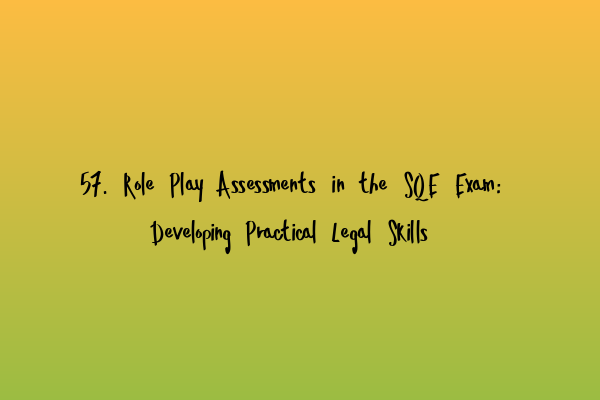Role Play Assessments in the SQE Exam: Developing Practical Legal Skills
Welcome to our blog post on role play assessments in the Solicitors Qualifying Examination (SQE) exam. In this post, we will explore the importance of role play assessments in developing practical legal skills and how they are incorporated into the SQE exam. Whether you are a law student preparing for the SQE exam or a professional looking to enhance your legal skills, this article will provide valuable insights into the role play assessments in the SQE exam.
What are Role Play Assessments?
Role play assessments are an integral part of the SQE exam and are designed to evaluate your ability to apply legal knowledge to real-life scenarios. During these assessments, you will be presented with simulated client meetings or negotiations, where you will be required to demonstrate your legal skills and problem-solving abilities.
These role play assessments aim to test your communication skills, your ability to analyze legal problems, and your capacity to provide practical and effective solutions. By engaging in role play scenarios, you will gain hands-on experience in dealing with clients and develop the necessary skills to navigate various legal challenges.
Developing Practical Legal Skills
The SQE exam recognizes the need for solicitors to possess practical legal skills in addition to theoretical knowledge. Role play assessments allow candidates to demonstrate their ability to navigate real-life legal situations, enhancing their practical legal skills.
Through role play assessments, you will develop the following practical legal skills:
- Client Communication: Role play assessments provide a platform to practice effective client communication. By engaging with simulated clients, you will learn to listen actively, ask relevant questions, and provide clear and concise advice.
- Problem-Solving: Role play assessments help sharpen your problem-solving skills. You will be presented with complex legal problems and will need to analyze the issues, identify relevant laws, and propose appropriate solutions.
- Negotiation: Negotiation is a crucial skill for solicitors. Role play assessments give you the opportunity to experience negotiations firsthand. You will learn to effectively communicate, compromise, and reach mutually beneficial agreements.
- Advocacy: Role play assessments allow you to develop your advocacy skills, enabling you to effectively present arguments and make persuasive submissions in a simulated courtroom setting.
Incorporation of Role Play Assessments in the SQE Exam
To ensure that candidates are tested on practical legal skills, the SQE exam incorporates role play assessments into its structure. These assessments are typically conducted in person and are observed by trained assessors.
During the role play assessments, you will interact with professional actors who play the role of clients or other parties relevant to the scenario. This realistic simulation provides a dynamic environment that tests your ability to respond to client needs, handle difficult situations, and provide practical advice.
The SQE exam assessors evaluate your performance based on a set of predetermined criteria, including your ability to communicate effectively, analyze legal issues, and provide appropriate solutions. This ensures that the role play assessments are conducted in a fair and consistent manner.
Preparing for Role Play Assessments
Proper preparation is essential to excel in the role play assessments of the SQE exam. Here are some tips to help you prepare:
- Practice: Practice role play scenarios with fellow students or professionals to familiarize yourself with the format and gain confidence.
- Study the SRA Standards: Familiarize yourself with the Solicitors Regulation Authority (SRA) standards and guidelines to ensure that you adhere to ethical and professional principles during the role play assessments.
- Seek Feedback: Ask for feedback from trainers, mentors, or assessors to identify areas of improvement and refine your performance.
By following these tips and engaging in focused practice, you will be well-prepared to showcase your practical legal skills in the role play assessments of the SQE exam.
We hope this article has provided you with valuable insights into the role play assessments in the SQE exam. If you would like to further enhance your preparation for the SQE exam, we recommend checking out these related articles:
